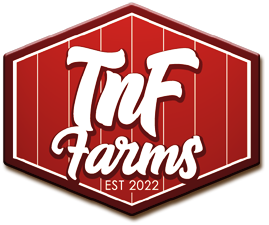Registered Livestock: Weighing the Pros and Cons
When it comes to raising livestock, whether for meat, milk, or other products, farmers often face a choice between registered and non-registered animals. Registered livestock, which are typically associated with purebred or pedigree breeds, come with their own set of advantages and disadvantages. In this post, we’ll explore the pros and cons of raising registered livestock to help farmers make informed decisions about their animal husbandry practices. TnF Farms has both registered and unregistered livestock. The animal’s purpose is dependent on whether or not it is registered. TnF Farms is also a member of the American Guinea Hog Association.
The Pros of Registered Livestock:
- Pedigree and Breed Standards: Pro: Registered livestock are associated with specific breeds and have documented pedigrees. This ensures genetic purity and adherence to breed standards, making them suitable for breeding and shows.
- Higher Market Value: Pro: Registered animals often command higher prices in the market compared to non-registered ones. This can lead to increased revenue for farmers, especially when selling breeding stock.
- Selective Breeding: Pro: Registered livestock allow for selective breeding to improve specific traits such as size, meat quality, milk production, or wool yield. This can lead to the development of superior genetics over time.
- Show and Competition: Pro: Registered animals can be showcased in agricultural fairs, exhibitions, and competitions, offering farmers opportunities for recognition and awards.
- Access to Breeding Programs: Pro: Some breed associations and organizations offer breeding programs, genetic testing, and resources for registered livestock, which can assist in improving the herd’s overall quality.
The Cons of Registered Livestock:
- Higher Initial Costs: Con: Acquiring registered livestock often requires a larger upfront investment compared to non-registered animals, which can be a barrier for small-scale farmers.
- Increased Record-Keeping: Con: Registering livestock involves meticulous record-keeping to maintain pedigrees and adhere to breed standards, which can be time-consuming.
- Limited Genetic Diversity: Con: Focusing solely on registered breeds can lead to limited genetic diversity within a herd. This can make animals more susceptible to diseases and environmental changes.
- Rigidity in Breeding: Con: Breeding registered livestock for specific traits can lead to rigidity in the genetic pool, potentially sacrificing adaptability and resilience in the face of changing conditions.
- Market Constraints: Con: The market for registered livestock can be smaller and more niche compared to the broader livestock market. This may limit the number of potential buyers.
The decision to raise registered livestock is a complex one that depends on a farmer’s goals, resources, and preferences. Registered livestock offer the benefits of pedigree, higher market value, and selective breeding potential. They also come with higher initial costs, increased record-keeping requirements, and potential limitations in genetic diversity.
Ultimately, whether to raise registered or non-registered livestock should align with your specific farming objectives. Some farmers may choose to focus on registered breeds to participate in shows and breeding programs. Others may prioritize genetic diversity and cost-effectiveness. The key is to carefully evaluate the pros and cons in the context of your farm’s needs and long-term goals. This will ensure that your livestock management strategy aligns with your overall farming philosophy.



